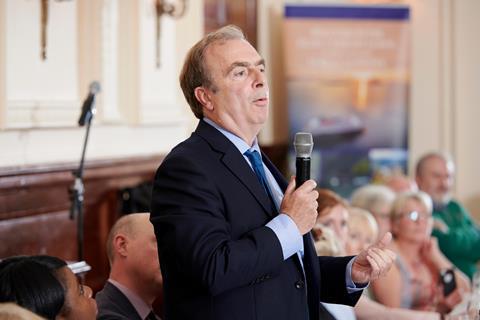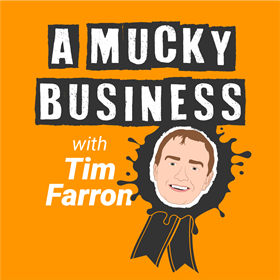The 70 year-old journalist and commentator Peter Hitchens, speaks to Tim Farron about moving from atheism to Christianity, how art and architecture cemented his belief in final judgement and why he believes Christian politicians should expect to be reviled by their fellow MPs

Peter Hitchens, you were brought up in the church but chose to leave it and became an atheist. In more recent years you've returned to the faith. How did that happen?
I wouldn’t say I had a particularly Christian upbringing. My parents left it to schools to teach me the basics of the faith. I went to boarding school from the age of seven and was constantly exposed to religious education and regular services. Hardly a day went by without me singing one of the hymns, ancient and modern. And I learned the cadences and the most important words of the Book of Common Prayer 1662, which I’m also very grateful for.
I declared myself an atheist at around the age of 14. I found atheism extremely attractive because at the time I was even more selfish, willful and disagreeable than I am now. And it was an extremely appealing creed.
I remember trying to set fire to my Bible on the playing fields of my school at Cambridge. There was about 20 years in the middle of my life when I was an actively hostile, scoffing atheist. But I found that as time went on, that it was increasingly unsatisfactory. So I decided to return to the faith of my fathers. I got myself confirmed in the Church of England when I was about 33.
Why did atheism appeal to you?
I wanted to live a life of complete liberty from restraint, where I chose what I did and nobody else chose it for me. And nobody was able to judge what I did on any grounds other than what suits me. And there still is, of course, a strong desire to do what I want. At that time, I could see no argument for any restraint, or any reason to believe I should be restrained. But that changes as you grow and experience what I like to call "wisdom", although I’m not sure other people would call it that.
I think we can call it wisdom, Peter.
Okay, but lots of other people wouldn’t. I had a brother [Christopher Hitchens] who rather famously took the opposite view so I had to spend quite a lot of time confronting this - more than most people would. My brother exploded, but I’d always known since I was about ten that he had a growing hostility to religious belief.
When I returned to my faith and began to confront a lot of people on the vague left of politics who would chide me for [my beliefs] I had to develop a coherent response. So it was very useful to me to be opposed. It’s very useful to the development of any position.
Take it as a compliment when you're hosed down with slime
What was it about atheism that didn’t satisfy? And what is it about Christianity that does?
One of the things I do in my spare time is go to the great art galleries of Europe, including in this country, and I look at pictures.
I also have always been very moved by architecture, probably the most powerful of the arts, apart from music. I saw, in those things, that my enjoyment was completely banal unless I could confront the fact that so much of this art - and so much of this architecture - was devoted to the glory of God.
Many people have claimed this to be some sort of conversion experience, which I have not had. But I went while on holiday in France to a great, late-medieval hospital. And they have on display a tremendous picture of the Last Judgement by Rogier van der Weyden. The people hurrying to their doom on the wrong side of the Last Judgement were naked and, having been stripped of any kind of medieval appearance, looked enormously like me and the people I knew. And in a few seconds, I thought, what if there is a last judgement? Because if there is I’m certainly going down the stairs, rather than up the stairs.
It would be impossible for us to understand the nature of the outcome of justice in the universe, but it seems to me that the message was very, very plainly sound, both in scripture and in art that there might be justice in the universe, and in that case, which side of it was I on?
Has atheism become the established faith in many Western liberal democracies?
I think the collapse of Christianity, which took place during and after the first world war, has resulted in an awful lot of people in search of a new set of ethics. The pursuit of human rights is part of that to try and erect some sort of set of beliefs which replaces the sermon on the mount. It’s an attempt to replace the theist system with one without God.
The arena of politics is increasingly secular and God-hating
Do you think that having an established Church of England has an effect on the way in which we’re governed?
I think people who say, “let’s get rid of it” are like people who move into an old house and say “I don’t like the look of that wall, it gets in the way of things, can’t see the point of it, let’s knock it down." ... And then the house falls down.
I think the established Church plays more of a part in our national life than people realise. The Church’s existence in England, as a series of parishes in every square inch of the country, does have an enormous impact everywhere. This includes many of the roughest and most unpleasant parts of our poorest cities. There’s a presence of the church and an awful lot of good is done by that. if you got rid of that (because I think without an established Church that would disappear) you’d be losing something very important.
You’d also be losing a declaration. And this will come up at the next coronation, which we have to accept is bound to happen. The last coronation was an extraordinarily clear declaration that this was a Protestant Christian country of a certain character. If you watch that service, I don’t believe that anything of that kind could actually take place at the next coronation. So what will it be that we will believe? We will believe in something. And I think without a belief in something, society is just a howling wilderness.
People who are in politics, who have a religious faith sometimes find themselves treated with suspicion - you can believe what you like, but don’t let it influence your decisions. Is that a feasible or desirable way forward?
We’re warned in the Gospels that standing up for faith will lead to being reviled, despised and abused. This will happen. We’re also told in that this is a great triumph, when it happens. In modern language you could say it’s a demonstration of the fact that you’re doing something good.

The arena of politics is increasingly secular and God-hating. So the principles of the faith are going to be reviled. And therefore the question is on what issues do you [speak up]? How do you express it? There are enormously complicated issues. But once you’ve decided to speak, then I think you have to take it as a compliment that you’re surrounded by howls of execration and being hosed down with slime.
This interview was first broadcast on Tim Farron's 'A Mucky Business' podcast. Download it here





































